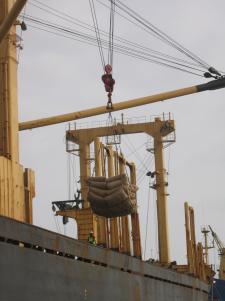- English
- Français
- Português
Stabilizing of Cashew Trade in Guinea Bissau Following Political Turmoil
After a tumultuous few months in Guinea Bissau following the coup that occurred in mid-April of this year, trade activity has now begun to stabilize. In the last newsletter it was reported that the absence of government authority was preventing export authorization. This trade interruption was resolved for the cashew industry in early June, when the 50 CFA (US$0.10) cashew development tax was reconfirmed by the government. Before the coup, the tax was paid to the Chamber of Commerce. After a long break in trade activity following the opening of the season, the month of July saw steadily increasing exports. By the first week of the month, nearly 40,000 MT were exported from Bissau, although large amounts of RCN awaited shipment in the production zones. Despite reaching 70,000 MT of exported cashew by the close of the season, figures for this year are significantly lower than those for the same period in 2011. Factors including the limited availability of shipping vessels, high moisture levels in stocks arriving in Bissau, and ongoing uncertainty regarding the authority overseeing exports have contributed to sluggish trade activity.
Cashew is one of Guinea Bissau’s most important crops, thus achieving regular trade levels is essential to ensuring economic stability in the country. At the beginning of 2012, the International Monetary Fund estimated an economic growth rate of 4.5% for Guinea Bissau, but the transitional government recently released data indicating that expected growth is now much lower at 2.8%.
As the 2nd largest producer of RCN in Africa, Guinea Bissau is an extremely important country to the cashew industry. The ACA secretariat will closely monitor the political situation there and note major implications for the cashew industry.



